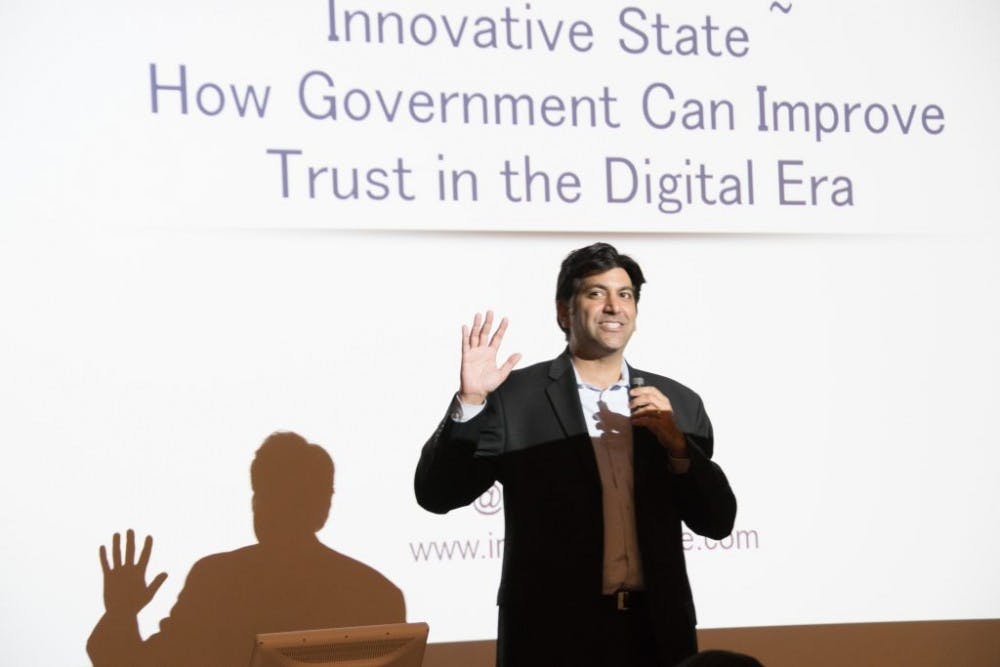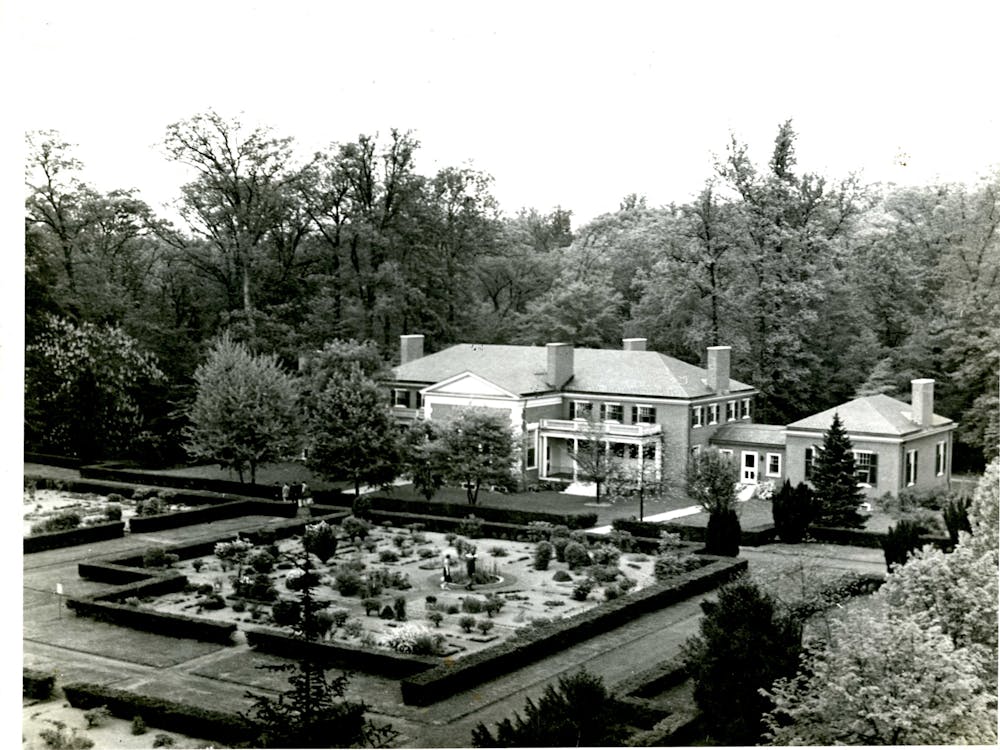Former Chief Technology Officer (CTO) of the United States Aneesh Chopra explored how the U.S. government could improve trust in the digital era at the latest Foreign Affairs Symposium (FAS) talk.
His lecture, titled “The Innovative State,” took place on Wednesday evening in Mudd Hall.
Keeping in line with this year’s FAS theme of “Undercurrent,” Chopra, who was CTO under President Barack Obama, argued that the state should use technology to disrupt the status quo.
Chopra, Hopkins Class of 1994, focused his talk on the way technology has reshaped how people see the world and how governments operate.
He began by providing background about the way technology can be used to improve public health. He explained that GPS technology was originally a government-funded innovation that has been opened for commercial use. When a researcher put GPS chips on inhalers and recorded the time and place of asthma attacks, they could easily identify the polluted areas in cities associated with more attacks.
According to Chopra, these discoveries led to pollution reduction that directly attacked the root cause of the problem.
“This public health intervention, powered by data and harnessing the power of the internet, leveraging an open data set, had resulted in this very interesting economic benefit, which is better outcomes at lower costs,” he said.
He stressed the importance of these technologies in improving public health in the United States.
“That’s the art of the possible,” Chopra said. “And the role thatI played for President Obama was very much tied to this hypothesis. If we can harness the full power and potential of the internet, we can actually find a way to make our government work better [so] that we can solve problems.”
Chopra noted that despite constant technological advancements, most people are cynical about the government’s ability to solve problems.
“The reality is, faith in government has gone down since the Eisenhower administration,” he said. “We had a bit of a spike after... 9/11, but for the most part we’ve got an environment where people are less confident that the public sector is going to help them in their daily lives.”
Chopra explained that although America is often viewed as a nation in a perpetual state of progress, the reality now is that older generations believe that the U.S. was better off in the past. However, he remained positive that things would improve.
“This internet economy we have is making our personal lives so much richer, connecting us to so many people, enriching our lives. But then there’s this big divide about what this might mean for the public sector,” he said. “I find that we’re in the most entrepreneurial period of problem solving.”
He stated that despite the current tumultuous state of domestic and international politics, he was confident that the situation would improve.
Chopra is hopeful that people who understand the power of the internet will restore the U.S. to a state in which the public has faith in their government.
He cited his experience with the Obama administration as proof. As CTO, his goal was to modernize the way services are delivered by bringing new technologies into the public sector.
He described how other companies like Procter & Gamble and Facebook, which have succeeded in harnessing the enormous power of technology, have succeeded.
“This is about culture, mindset. A belief system that ideas everywhere can inform and advance a mission objective that is critical to your goals,” he said. “So in that sense, culture change and open platforms became two critical ingredients in our overall strategy.”
The power of the internet, Chopra explained, is something that both Republicans and Democrats can support in the hopes of making the U.S. better. He believes that in order to accomplish this, the government needs to make open data the new default, so that public sector leadership can take full advantage of it.
“We need... the ability to connect government with entrepreneurship and innovators who can take that information, take those resources, and build the products and services that actually will help us lead better lives,” Chopra said.
Adopting a more open data philosophy and making data more public could have enormous economic benefits as well, according to Chopra.
“Researchers have found that if we figured out all the talent that’s in our country and around the world and we find the ideal match for that talent... we can boost the global GDP by $2.7 trillion,” Chopra said. “Publishing information on which particular areas are in demand will let people know exactly what gaps need to be filled when they begin career training or a job search.”
Chopra ended his talk by reaffirming his confidence that the situation would continue to improve along with the advancement of modern technology.
“This is the future that I believe is coming if we find ways to harness all of this power and potential of the internet to solve problems,” he said.
One of FAS’ three executive co-directors, junior Tim Shieh, explained how Chopra’s area of expertise fits in with the Symposium’s theme, “Undercurrent.”
“This is a great example of how the intersection of technology and government and politics all bring about understandings of the world that are more relevant,” Shieh said. “In a world where the internet is everywhere while there are massive challenges like healthcare and information access, we thought that this would be the perfect person to talk about these kinds of issues.”
Overall, Shieh believed that Chopra’s talk was successful.
“We really hope that students and community members who came out could actually get firsthand experience from the account of someone who’s worked in the administration and also has some experience in the private sector,” he said.
Shieh believes that Chopra’s technological expertise made him a valuable speaker.
“He was very energetic on an issue that might not be so interesting to a random person,” Shieh said. “He was really able to talk about data and government in a way that was different.”
Freshman Divya Baron commended Chopra for his innovative strategies in working to unite the public and private sectors to affect technological change and make the system more efficient.
“I was most impressed by the ability of the government to work with the private sector in order to improve the lives of people who will probably never even know that the government was involved in the technology or data that they’re using,” she said.
Baron related in her own words what she believed was Chopra’s main argument.
“From what I understood of Chopra’s talk what he said was that he would prefer to build the systems first and then trust in the public to use and appreciate this technology, with his main focus being on building the systems first rather than asking for the public’s trust and then building the system,” she said.
Junior Jake Kim enjoyed how Chopra dispelled myths about the government and bureaucratic methods of instigating change.
“It was interesting that according to him, the public sector used to be the bastion of creativity and productivity,” Kim said. “I thought the government gets a bad rap with bureaucracy and is generally considered slower than the private sector, which is more true this days, but it was interesting to learn that’s not quite the case.
Kim connected his own experiences as an engineer with Chopra’s focus on open data.
“I thought the initiative of open-sourcing information across all agencies was great,” he said. “As an engineer I believe that if anything is going to be the conduit of change between policy to real lives, it is going to be technology.”
Kim then stressed the importance and relevance of Chopra’s talk in light of the current political climate.
“Infusion of talent and productivity into the public sector are even more relevant today given the recent changes in leadership,” he said. “But I think it’s important to note that that doesn’t reverse all advances we’ve made, and it’s ever more important for us to stay engaged in these dialogues.”























Please note All comments are eligible for publication in The News-Letter.